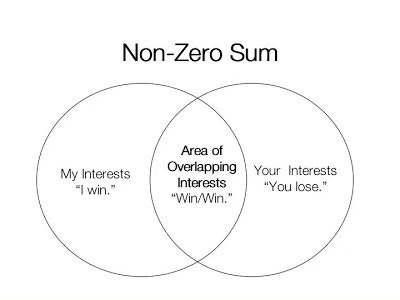Beyond Winning and Losing: How Non-Zero-Sum Thinking Transforms Life and Economics
Why Cooperation and Mutual Gain Can Outperform Competition and Rivalry
You know what is the biggest blessing of the human mind? It can change even the deepest held patterns and beliefs. It can adopt new frameworks to think, and new ways to live. And what can be a bigger joy in life than finding a framework to think which forces you to search for win-win solutions in conflicts?
"Life is not a zero-sum game"—this phrase has profoundly shaped my outlook on life. It has influenced how I think, how I make decisions, and how I interact with others.
What does it mean? Am I just explaining another fancy Economic principle today? Or does it have anything to do with the everyday life of my dear readers? Before we start understanding it, I just want to remind you that Economics is a way to understand people and their behaviors.
Zero-Sum vs. Non-Zero-Sum Games
A zero-sum game is where you can win only when your opponent loses. It is how the sports work, if India needs to win, England must lose. In contrast, a non-zero-sum game is about finding win-win situations where everyone benefits, much like a team working together to achieve a common goal.
Here's a simple story to illustrate the concept of a non-zero-sum game in everyday Indian life:
The Shared Water Well
In a small village in India, there is a communal water well that serves as the primary source of water for all the families living there. Every morning, the villagers gather around the well to draw water for their daily needs. One day, a new family moves into the village, increasing the water demand.
Initially, some villagers worry that the increased demand will lead to water scarcity, thinking that more water taken by the new family means less water for everyone else. However, the village head proposes a different approach. He suggests that instead of drawing water all at once, each family could stagger their timings throughout the day, allowing the well to replenish naturally. He also introduces the idea of collecting rainwater during the monsoon season to supplement the well's supply.
The villagers agree to try this plan. They begin to coordinate their water collection times and work together to set up rainwater harvesting systems. As a result, the well remains full, and everyone has enough water. Not only do they avoid water scarcity, but they also find that their cooperation leads to better water management and more sustainable usage.
Explanation:
This story demonstrates a non-zero-sum game because the villagers realize that by working together and sharing resources more efficiently, they all benefit. The situation is not about one family's gain being another family's loss. Instead, it's about creating a solution where everyone can win. In a non-zero-sum game, cooperation and collaboration often lead to better outcomes for all parties involved, much like the villagers who find a way to manage their shared resources without depleting them.
Observe the image. See both the customer and barista have happy faces. The customer is happy because she got her coffee and the barista is happy because she got money. Here, both say thank you to each other, this is called a Double Thank you moment. It refers to situations when both people win, when both get what they desire, without beating another one.
Importance in relationships
Rational human beings should be treated as an end in themselves and not as a means to something else.
-The philosopher Immanuel Kant
Capitalism has done many positives to this world, often sometimes at the cost of nature and humans. One such harm it did is the harm to our mentality, the harm in how we think about new connections, new friends, and new relations. Before even meeting the person we are planning to, we check their profile and start planning how we use them to advance our personal or professional gains. The value of a person in our lives is now based on how much he/she can benefit us.
The romantic relationships, the parent-child relationships, and the professor-student relationship are just being reduced to a mere transactional aspect of it. The parents are important for a child because they can fulfil his sustenance requirements. A child is important for parents because they have ‘invested’ in their lives to reap its returns one day.
Non-Zero-Sum Thinking in the Workplace
The thought of writing on this topic came to my mind when I was reading about the dismal state of female workforce participation in our economy. While learning about various socio-cultural and economic reasons for it, I also found a behavioural and mindset reason for this. Many women reported that just the news of their marriage or pregnancy reduces their hiring prospects, and if already in the labour force, promotion and appraisal prospects to a large extent. Employers feel reluctant to hire them or increase their salaries because they would have to pay her during her maternity leave, which many consider a vacation.
Non-zero sum thinking pushes us to think in longer time horizons. When we treat our clients with the mindset of having long-term relationships, we never compromise the quality of our services. When we treat our employees and employers to build a longer-term relationship, we never think about the silly issues of maternity leave, etc.
How do the abundance mentality and zero-sum thinking reward us with a healthy mental state?
These days, I feel less sad about the lost opportunities, or any of the rejections, cursing the other person who got selected instead of me. Because non-zero sum mentality forces me to think that the other person has not won by defeating me, but he got his place and I will get my own. Here, the abundance mentality helps. When we don’t think about the world with a small set of opportunities, but as the tides of a vast ocean that keep coming to us below the shining morning sun.
Non-zero sum solution for the inter-state fight for greater funds in India.
In India, we see the states fighting over a larger share of the Union budget every time. Instead of fighting the central government which is the actual beast, they fight with each other. The idea is that securing a larger share of funds is often seen as easier when it comes at the expense of other states.
Let us take a pause for a moment, and think for ourselves what would be a non-zero-sum solution in this case.
Currently, the union government allocates 42% of its divisible pool of funds to the states, distributing these funds based on a set of rational criteria. Meanwhile, the union government retains the remaining 58% of the pool and also imposes various 'cess' taxes, which are not included in the divisible pool.
Here, a better, win-win solution for all the states would be to unite together. They can then put forth their demand firmly on the table for higher tax funds in two ways:
Union government must increase the devolution percentage of funds from 42% to 52%.
They must also include the large sums of cess funds they collect in the divisible pool.
With this abundance mentality, states can have a larger share of the pie for everyone. This approach increases the total available funds, ensuring all states receive more without taking away from each other.




